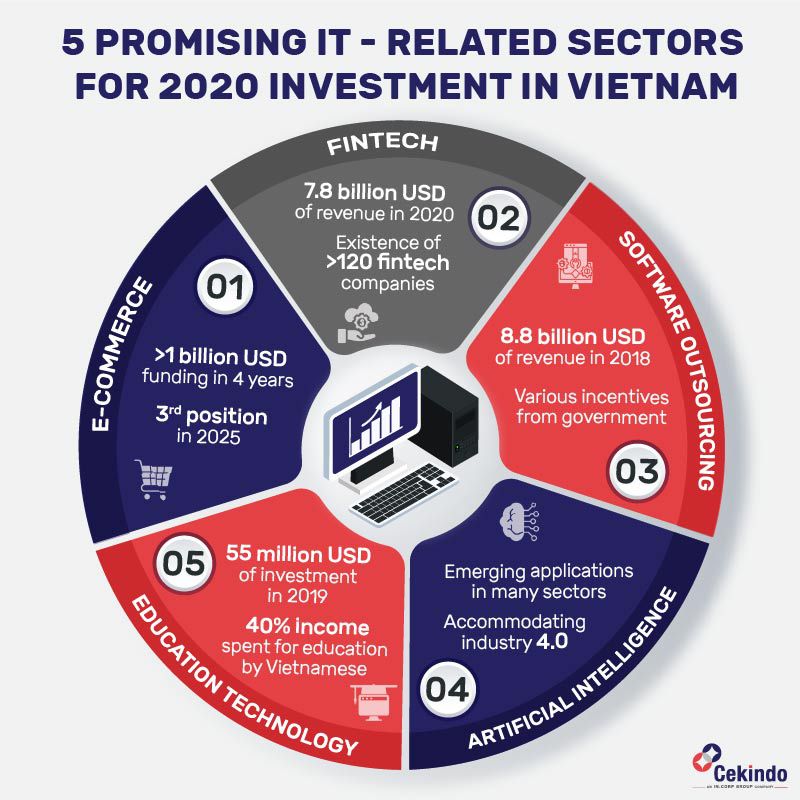Vietnam’s information technology (IT) market has been gaining momentum recently as the country is now moving from low-tech manufacturing to a service-oriented economy. IT companies in India and China are now facing competition due to the boom of Vietnam’s IT industry. When it comes to investing in Vietnam, foreign investments in IT businesses will have a more drastic growth continuously due to Vietnam’s recent adoption of Industry 4.0 across every industry.
Interested in Investing in Vietnam? Check out Cekindo’s Business Set Up Services
All these IT-related sectors in Vietnam are mostly funded by foreign investors, with projects focused on building electronic components. Data has shown that more than 86% of total IT revenues came from hardware in 2017 in the country.
Recently, Samsung – a big corporate from South Korea, decided to construct an R&D center and eight factories in Vietnam; and Intel Corporation has also built a testing facility and assembly factory in Ho Chi Minh City.
We’re going into more details on Vietnam’s booming IT sectors in this article.
Here are the five IT sectors that are shown to have great potential for huge growth and investments in Vietnam:

1. E-commerce
According to Vietnam E-Commerce Association, by 2025, the e-commerce sector in Vietnam will be ranked third after Indonesia and Thailand.
Most of Vietnam’s e-commerce activities can be found in Hanoi and Ho Chi Minh City and their sales contribute to 70% of the country’s total e-commerce sales.
The internet economy in Vietnam has brought in more than US$1 billion in funding in the past four years.
These other reasons are appealing as well: e-commerce turnover in Vietnam is forecast to reach US$10 billion by 2020, along with approximately 30% of the Vietnamese people will shop online (approximately 30 million online shoppers). And currently, Vietnam has a population of 96 million people with a rapidly increasing number of smartphone and Internet users, making Vietnam the most tempting country for abundant e-commerce businesses.
RELATED: IT industry in Vietnam, 2021 Update
More about e-commerce business in Vietnam
If you are interested in diving into the e-commerce sector in Vietnam, it is a great idea to familiarise yourself with various types of e-commerce businesses in the country, so that you can choose the most ideal one for you.
- Online Retailers
The first one is online retailers. In Vietnam, the online retailers store their own products and sell them without having to rely on other vendors’ advertising capacity but sell their products from the stock they keep.
Many of these online retailers started their businesses in traditional stores. They have observed the potential of starting an online business and decided to establish an online presence to be able to increase the sales of their products and gain more profits.
- Online Marketplaces
What about online marketplaces? An online marketplace is a website that allows different vendors to sell their products under the same platform. Payments and advertisements are carried out on the website platform.
Customers are into online marketplaces because these are the places where they can easily find a variety of products under one roof, even though the sellers are different. In Southeast Asia, some of the leading online marketplaces are Shopee, Lazada, whereas renowned international giant marketplaces include Amazon and eBay. You may also have heard of Aliexpress, a giant marketplace from China.
- Online Classifieds
In Vietnam, online classifieds are more or less the same as online marketplaces. The only difference is that an online classified website does not mediate payments. In other words, buyers transfer the money directly to the sellers. Sellers are only able to control their own advertisements.
2. The Quickly Evolving Fintech Industry in Vietnam
By 2020, the revenue of the fintech industry in Vietnam hit approximately US$7.8 billion. This evolution is mainly due to the growing middle class, increasing young population, and rising internet usage in Vietnam.
There are at least 120 fintech-related companies in Vietnam now, covering services from digital payment to wealth management, blockchain to cryptocurrency.
Digital payment is a leading fintech segment in Vietnam
Over 66% of Vietnamese fintech companies are involved in digital payment services via online payment apps, and they have taken over 87% of the fintech market share.
The rise of digital payment fintech companies can be seen when the State Bank of Vietnam (SBV) issued licenses to 27 intermediary payment service providers, of which most of them are e-wallet service providers.
Personal finance is an emerging fintech segment in Vietnam
Personal finance is about the financial activities and decisions of households or individuals. These activities include saving, earning, saving, spending, and investing that are all performed online.
At these current growth rates of smartphone users and Internet penetration, as well as the surge of digital payments, personal finance is to grow rapidly until 2025.
Emerging markets in this segment in Vietnam are online peer-to-peer (P2P) lending platforms, personal advisors through AI, and group saving.
3. Software Outsourcing
A survey has shown that 73% of companies and organizations will utilize software outsourcing in Vietnam, making software outsourcing an IT industry with great potential for the past decade.
Compared to India and China, Vietnam has now become a cheaper alternative as an outsourcing destination globally. Revenue of US$8.8 billion was recorded in 2018 for Vietnam’s software industry.
In order to advance the growth, the Vietnamese government is providing different incentives to the industry and allocating funds to build high-tech parks.
4. Artificial Intelligence (AI)
The artificial intelligence (AI) industry in Vietnam is still developing but it has also become one of the IT-related industries with strong potential.
The country sees a robust application of AI to many sectors including education, agriculture, healthcare, transport, human resources, e-commerce, and others.
It is certain that the implementation of Industry 4.0 can help develop the AI sector in Vietnam further. Foreign investors interested in investing in Vietnam will surely need to consider this sector.
5. Education Technology
In 2018 alone, education technology (Edtech) in Vietnam has gained US$55 million in total investments – thanks to the Edtech centers being able to close the gap between traditional education settings and learning requirements.
This sector has attracted investors from all over the world, especially those from Singapore, South Korea, Japan, and Australia. They are particularly interested in education sectors from kindergarten to grade 12 as Vietnamese spend as much as 40% of their income on them.
How Cekindo can Assist You in Investing in Vietnam
Since the 90s, Vietnam has had a relatively open economy and has been ranked one of the easiest countries in Southeast Asia to do business. Cekindo would like to help investors from all around the world to enjoy this high level of economic freedom in Vietnam by setting their companies in the country to start investing.
For foreign investors wishing to establish a presence and operations in Vietnam, the most common forms of incorporation are foreign-owned companies and representative offices. Cekindo’s business setup service in Vietnam can help your new business to gain the best possible chance of success and prosperity.
Take the next step by contacting Cekindo today through the form below and we will give your startup a head start. Investing in Vietnam will be a seamless journey.
